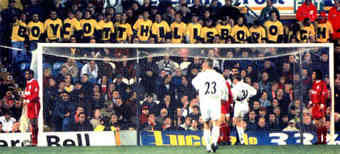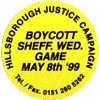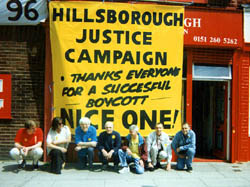Since forming, as a proactive collection of Hillsborough families, survivors and supporters in Feb 1998, the Campaign has struggled to bring Hillsborough and the continued lack of justice back into the public domain on many occassions.
Many people are aware that all clubs now observe a minutes silence on 15th April following the group's letter campaign. In this section you can read on this and other successes the group has acheived, as well as ongoing activites.
Click here to find out the latest news.
The Hillsborough Justice Campaign
PO Box 1089
178 Walton Breck Road
Liverpool
L69 4WR
Tel / fax : 0151 2605262
email: hjcshop@tiscali.co.uk
The Boycott of Hillsborough
The following is an account of how and why the Boycott of Hillsborough on 8th May 1999 was organised:
The idea of boycotting Hillsborough had been around since shortly after 96 Liverpool supporters were killed and over 400 injured in a so called 'Perfect Venue.' In 1989, Hillsborough Football Ground failed to meet several safety standards. The Leppings Lane end had inadequate turnstiles, weak crush barriers and a capacity 22% greater than the pens could safely hold. No one from Sheffield Wednesday had ever faced criminal proceedings and many thought a Boycott was worth organising. As soon as the Hillsborough Justice Campaign had formed in February 1998, we made it known that we had formed to be more pro-active. Soon enough, families, survivors and Liverpool supporters agreed that a Boycott must be organised. The idea was proposed at one of our first meetings, and we had further reasons to back the Boycott 100%.

Back in 1997, the day after a huge Justice concert at Anfield, Liverpool supporters travelled to Hillsborough on the last league game of the season. Many supporters took floral tributes but South Yorkshire Police confiscated these and Justice Banners from supporters and even bereaved families and friends. Many supporters were furious with talk of a Boycott doing the rounds soon after.
The away end at Elland Road, Leeds vs. Liverpool 1999
The following season 1998, the game at Hillsborough was on February 14th, once again flowers were taken off supporters, apparently a rose can be deemed as an 'offensive weapon' by South Yorkshire Police whose behaviour and attitude was once again provocative. Worse still, the actual game was sponsored by the SCUM (Sun) 'Newspaper,' a gutter rag which accused the supporters in 1989 of 'killing their own, robbing the dead and urinatingon brave coppers.' A successful Boycott of the paper since 1989 was proof that some Boycotts can work.
By February 1998, the Hillsborough Justice Campaign had formed, and was to become instrumental in organising the Boycott. It is important to note that a Boycott of a football game by supporters, to our knowledge, had never been tried before. We were entering uncharted territory but nevertheless we backed the idea even though we knew we would encounter some difficulties. Those in our group who were Liverpool supporters told us that a massive leafleting campaign would have to be initiated.
We began to first leaflet about the Boycott months in advance, luckily the game at Hillsborough wasn't until 8th May 1999 and we first notified the local press and the local fanzines of our intention to Boycott in the Autumn of 1998. The reaction was favourable and we soon realised that a Boycott had a lot of support amongst Liverpool supporters. All that was needed was an organisation prepared to co-ordinate the publicity and serve as a communication headquarters.
 The Hillsborough Justice Campaign was happy to be guided by the supporters wishes, and our close proximity to Anfield enabled us to publicise the Boycott at every home game. Away games were also leafleted by our members who follow Liverpool FC far and wide. Publicity for the Boycott intensified as the New Year passed. We began to phone radio shows, write to the media and the leafleting campaign was stepping up pace with different leaflets being issued each week, and the ever popular 'Boycott stickers' being produced and distributed as fast as the printer could make them. Boycott posters began to appear in local pubs, shops and anywhere who'd have them and with two months to go to the Boycott things began to get hectic. Ten thousand leaflets were being given out at every home game and as many stickers. Boycott banners appeared in local pubs and shops and fly posters and graffiti also made it clearthat the message was popular. The support by now was amazing, the Boycott was looking to be a success but we decided to stage an alternative venue to Hillsborough - a tactic which admittedly we never planned from the onset. We knew a picket at Hillsborough would, given to the previous years encounters, be likely to be extremely difficult to say the least. So,we decided to arrange an alternative event on the 8th May to overcome the difficulties in arranging some kind of protest at Hillsborough .
The Hillsborough Justice Campaign was happy to be guided by the supporters wishes, and our close proximity to Anfield enabled us to publicise the Boycott at every home game. Away games were also leafleted by our members who follow Liverpool FC far and wide. Publicity for the Boycott intensified as the New Year passed. We began to phone radio shows, write to the media and the leafleting campaign was stepping up pace with different leaflets being issued each week, and the ever popular 'Boycott stickers' being produced and distributed as fast as the printer could make them. Boycott posters began to appear in local pubs, shops and anywhere who'd have them and with two months to go to the Boycott things began to get hectic. Ten thousand leaflets were being given out at every home game and as many stickers. Boycott banners appeared in local pubs and shops and fly posters and graffiti also made it clearthat the message was popular. The support by now was amazing, the Boycott was looking to be a success but we decided to stage an alternative venue to Hillsborough - a tactic which admittedly we never planned from the onset. We knew a picket at Hillsborough would, given to the previous years encounters, be likely to be extremely difficult to say the least. So,we decided to arrange an alternative event on the 8th May to overcome the difficulties in arranging some kind of protest at Hillsborough .
We decided that a concert would be a good idea and arranged for a number of bands to perform at St Georges Hall, a historical gathering point for protest in Liverpool. Our leafleting campaign was going well and increasing numbers of supporters were calling into our office/shop to hand out leaflets and offer whatever help they could. Bit by bit, we wereable to raise the profile of the Boycott and our finances were boosted as people were won over by our stance on the Boycott.
In February 1999, Sheffield Wednesday announced they would be building a memorial and the Boycott suffered a setback. The local press declared the proposed memorial a victory and conveniently played down the Boycott. Other groups declared "The Boycott would serve no purpose now, it would be futile." However the Hillsborough Justice Campaign had previously stated that the Boycott would happen 'memorial or no memorial.'
We immediately drew up, printed and distributed 20,000 'Boycott still ON' leaflets. Liverpool Football Club's official match programme only gave a platform to some bereaved families opposed to a Boycott, families supporting the Boycott got no opportunity to have their say. Survivors were simply dismissed out of hand.
By April 1998, the Boycott was given a major boost when Barnes Travel decided not to run any coaches to Hillsborough. Barnes Travel is a pretty big company on Merseyside and their coaches are popular with fans who need cheap travelling cost to away games. Barnes Travel conducted their own poll amongst supporters and agreed not to run any coaches to Hillsborough on 8th May 1999. The decision was much appreciated by the families and survivors as Rob Barnes, one of the Directors acknowledged that the decision by Barnes was 'in honour of the deceased, their families and the survivors of the disaster.'
On May 1st, soon after the 10th anniversary of the Hillsborough Disaster, a survivor was ejected from the Kop for displaying a 'Justice' banner. Supporters were furious, but it was at least a lesson in how much Liverpool Football Club supported the Boycott. The survivor was released without charge soon after a delegation of supporters protested at half time. The 'Justice' banner was flying again on the Kop on May 5th.
Liverpool Football Club had grossly misread the level of feeling over the Boycott. Finally, on the very eve of the Boycott, we had problems with Liverpool City Council who tried to cancel our booking of St Georges Hall. We sent a negotiating team who told the Council that thousands of people would be arriving no matter what. Luckily the Council saw sense but prevented our alternative event from being able to set up the stage outside. Fortunately, St Georges Hall is a suitable venue for accommodating large crowds indoors and we were able to use the purpose built stage to accommodate bands and various speakers during the following day.
On 8th May, the Hillsborough Justice Campaign had well and truly committed ourselves to this Boycott. If it failed, we knew that we'd be made to look fools, but even if it succeeded, we knew that our success would not be acknowledged as such by the media.
The event at St Georges Hall went down well, with over 5,000 attending throughout the day. Many travelled from far and wide and a great day was had by all. There was a great roar of approval when we announced the attendance figure at Hillsborough that day - and for the record, out of a total of 7,500 allocated tickets, only 1,062 (14%) were taken up, the most dismal response ever for Liverpool's final away game of the season.
The vocal support at Hillsborough was non-existent! - and a recordingof the match commentary is proof itself that the Boycott worked. During the day speakers were given a platform (and microphone) to make their own contributions. As one survivor of Hillsborough put it "We've made history today - not that it will be headline news."
 The Hillsborough Justice Campaign is proud to have been the catalyst for this particular Boycott and we thank all those who contributed in whatever way to making it a success.
The Hillsborough Justice Campaign is proud to have been the catalyst for this particular Boycott and we thank all those who contributed in whatever way to making it a success.
A properly organised Boycott is an effective way to gain concessions or just voice your anger at whatever club related issue. We hope that football fans everywhere recognise their own collective strength.
After all, if we had done so before Heysel and Hillsborough - the names of whole football grounds might not be associated with the deaths and injury of our fellow supporters.
Click here to read how the local media in Liverpool reacted to the boycott.
Postscript
LFCs first away game of the 1999/2000 season - Sheffield Wednesday versus Liverpool at Hillsborough . Liverpool FC requested to have this game at the beginning of the season in order that there would be "None of that boycott nonsense like last season."
This article is dedicated to the memory of JoeGlover. A Hillsborough survivor and rescuer who tried to safe his brother Ian Glover's life at the Hillsborough Disaster in 1989. Joe was killed in a tragic accident on 12th May 1999, four days after the successful Boycott. Joe died saving someone's life as a load of marble fell, a true working class hero. Joe was a founder member of the Hillsborough Justice Campaign and only recently had "begun to see a chink of light at the end of the tunnel."
